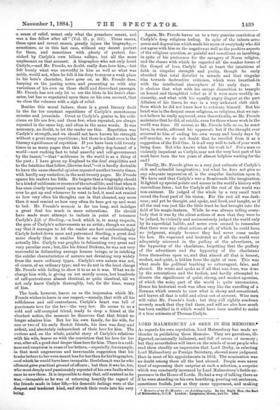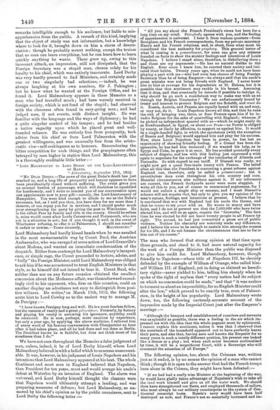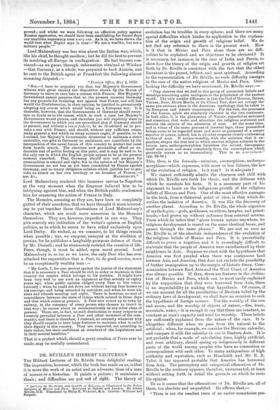LORD MALMESBITRY AS SEEN IN HIS MEMOIRS.* As regards his
own reputation, Lord Malmesbury has made no blander in publishing these Memoirs. They are garrulous, ill- digested, occasionally indiscreet, and full of errors of memory ; but they nevertheless will leave on the minds of most people who read them steadily an impression that Lord Derby, in selecting Lord Malmesbury as Foreign Secretary, showed more judgment than in most of his appointments in 1852. The nomination was no doubt among them all the best abused. People were never tired of expressing their surprise at such a selection, a surprise which was constantly increased by Lord Malmesbury's feeble ap- pearance in the House of Lords. He had a way of talking there as if he were standing on his own hearthrug, pouring out sentences, sometimes foolish, just as they came uppermost, and making • Memoirs of an Ex-Minister ; an Autobiography. By the Right Hon. the Berl of Malmeabury, G.C.B. London : Longman; Green, and Co. 1884.
remarks intelligible enough to his audience, but liable to mis- apprehension from the public. A remark of this kind, implying that the object of study was not information, but a knowledge where to look for it, brought down on him a storm of denun- ciation ; though he probably meant nothing, except the truism that no man can learn everything, but he can learn bow to learn quickly anything he wants. There grew up, owing to this incessant attack, an impression, still not dissipated, that the Foreign Secretary was a stupid man, chosen solely for his loyalty to his chief, which was entirely inaccurate. Lord Derby was very hardly pressed to find Ministers, and certainly made one or two singularly bad selections, — indeed, he was always laughing at his own nominee, Sir J. Pakington ;
but he knew what he wanted at the Foreign Office, and he found it. Lord Malmesbury appears in these Memoirs as a man who had travelled much ; had been warmly received in foreign society, which is not fond of the stupid ; had observed with the closeness often found in easy-going men ; and had judged men, if not events, with distinct insight. He was familiar with the language and the ways of diplomacy; he had a quite singular control of his temper; and he had besides a native sagacity upon which he placed great and well- founded reliance. He was entirely free from pomposity, took
advice from his chief or from Lord Palmerston with the greatest willingness, and was unusually free from the aristo- cratic vice—self-seekingness as to honours. Remembering the bitter competition for such things, and the graspingness often betrayed by men higher in station than Lord Malmesbury, this is a thoroughly creditable little letter :-
" LORD MALMESBERY TO LORD DERBY OS THE LORD•LIEDTENANCY OF HANTS.
" Achnacarry, September 17th, 1852.
"MY DEAR DERBY,—The news of the great Duke's death has just reached us, and a long life of prosperity and honour appears to have been providentially closed withoit suffering. The event gives you an unusual burden of patronage, which will doubtless be squabbled for handsomely, and I write to remind you of our conversation upon one appointment now in your gift—namely, the Lord-Lieutenancy of Hampshire. You were kind enough to allude to me as the Duke's successor, but, as I told you then, you have done for me more than I deserve, or can repay you for in services, and I should prefer mach your strengthening the party by giving the post to Winchester. He is the oldest Peer by family and title in the county. Should he refuse it, mine would come after Lords Carnarvon and Portsmouth, who are not in a situation to act ; but if you thought it well, in the event of Winchester refusing, to offer it to Palmerston, I should not consider
it unfair or unwise.—Yours sincerely, MALMESBURY."
Lord Malmesbury had hardly kissed hands when he was assailed in the most unwarrantable way by Count Bnol, the Austrian Ambassador, who was enraged at some action of Lord Granville's about Modena, and wanted an immediate condemnation of the despatch. Either from contempt for Lord Malmesbury's inexperi- ence, or simple rage, the Count proceeded to lecture, advise, and " bully " the Foreign Minister, until Lord Malmesbury was obliged to ask him if he was accustomed to treat English Ministers in that style, as he himself did not intend to bear it. Count Buol, who neither then nor on any future occasion obtained the smallest concession about the Modenese affair, was thenceforward exceed- ingly civil to his opponent, who, firm on this occasion, could on another display an adroitness not easy to distinguish from posi- tive wiliness. He writes,' on March 11th, 1852, the following acute hint to Lord Cowley as to the easiest way to manage M. de Persigny
"I have known Persigny long and well. He is a most fearless fellow, but the essence of vanity and a great perorateur. Formerly, by fluttery and piquing his vanity in assuming his ignorance, anything could be extracted. He is now, perhaps, more cautious by experience, but only a year ago, by applying the above medicine, I relieved him of every word of his famous conversation with Changarnier an hour after it bad taken place, and all he had done and not done at Berlin. The President knows he is faithful, but does not think more of his steadiness than I do."
We have not seen throughout the Memoirs a false judgment of men, unless, indeed, it be of Lord Derby himself, whom Lord Malmesbury believed in with a belief which tons seems unaccount- able. It was, however, in his judgment of Louis Napoleon and his intentions that Lord Malmesbury appeared at his best. The whole Continent and most men in England believed that Napoleon, then President for ten years, must and would avenge his uncle's
defeat at Waterloo by an invasion of England. The alarm was universal, and Lord Derby himself thought the chances were
that Napoleon would ultimately attempt a landing, and was preparing measures of defence; but Lord Malmesbury, as un- moved by his chief's opinion as by the public uneasiness, sent to Lord Derby the following letter :—
" All you say about the French President's views has been for a long time on my mind. Everybody agrees with you, and the feeling of apprehension is universal. I hear it from various quarters—from Brougham and his French correspondents, from my private secretary Harris and his French relations, and, in short, from what mast be considered the best authority for prophecy. This general terror of what Is coming is a presentiment, for none can give any reasons founded on facts to show the sinister feelings and intentions of Louis Napoleon. I believe I stand alone, therefore, in disbelieving them ; and these are my arguments has no natural dislike to the English. Ever since I knew him, he courted their society and imi- tated their habits. Twenty years ago, when he could not have been playing a part with me—who had even less chance of being Foreign Secretary than he of being Emperor—he always said that his uncle's great mistake was not being friends with England. I never knew' him to hint at revenge for his degradation at St. Helena, but it is possible that that sentiment may rankle in his breast. Assuming that it does, and that eventually he intends if possible to indulge it, why should he go such a roundabout way to make war with us as' through the Belgian Guarantee ? We are unfortunately bound by treaty and interest to protect Belgium and the Scheldt, and must do• it. Russia, Austria, and Prussia are equally bound with us, and may, or may not, do it. Louis Napoleon knows all this, and that he runs the risk of bringing two, three, or four Powers upon him if he in- vades Belgium for the sake of quarrelling with England ; whereas, if he picked an independent quarrel with us—which he might easily do• at Newfoundland, in Egypt, or about our Press—no Power is obliged' by treaty, or likely by affection, to support as against him. It would be a single-handed fight, in which the spectators (with the exception of Russia and Belgium) would applaud him and pray for his success. Now, since Louis Napoleon has been in power, he has lost no• opportunity of showing friendly feeling. If a Consul has been dis- agreeable, he has had him trounced ; if we wanted his help, as in. Egypt and Cuba, he gave it at once. He has avoided pointedly every subject of dispute, and has with this feeling just expressed a wish• again to negotiate for the exchange of the territories of Albreda and Portendie. So with regard to our tariff. If Disraeli was ready, we- might now get a quasi free-trade treaty with France. The belief after all this that the President is concocting a great scheme against England can, therefore, only be called a presentiment ; but it. nevertheless does exist throughout his own country and oars. Material circumstances also militate against it. if our informers, are correct, the French dockyards never were more sluggish. I write all this to you, not of course to recommend supineness, for I would not reduce a single ship or seaman, and I trust Disraeli's scheme will not require that, but only to give you my opinion of the• man's nature, feelings, and intentions at present. I believe that he- is convinced that war with England lost his uncle the throne, and that he means to try peace with us. He wants to marry and have heirs, and I do not at present see that the 7,000,000 who have twice elected him, and will do so again, require the fireworks.' The first- time he was elected he did not know twenty people in all France by sight. The second, he had just committed a gross act of public. violence. Neither his obscurity nor notoriety made any difference,. and I believe his name to be enough to sustain him among the masses for his life, and I do not foresee the circumstances that are to for3e- him out of his coarse."
The man who formed that strong opinion at that time upon those grounds, and stood to it, had more natural capacity for- the work of a Foreign Minister than the public was disposed to give him credit for. Lord Malmesbury, however, though- friendly to Napoleon—whose title of Napoleon III. he cleverly defended by the example of William of Orange, who called him- self William III. of England, yet in doing so claimed no heredi- tary rights—never yielded to him, telling him sharply when he' spoke of the right of asylum that " every nation had its subject on which no concession could be made," and that " it was useless to torment us about an impossibility, for no English Minister could alter the law," which proved to be exactly true, even of Palmer- ston, in the height of his popularity. Lord Malmesbury wrote, down, too, the following curiously-accurate account of the- impression made by the Imperial Court just after the Emperor's- marriage :—
" Although the banquet and establishment of courtiers and servants was us splendid as possible, there was a feeling in the air which im- pressed me with the idea that the whole pageant must be ephemeral. I cannot explain this sentiment, unless it was that I observed that the members of the household appeared not to have perfectly learnt- their parts, and also that, having seen and known the Emperor for so• many years in such a totally different position, his present one looked like a dream or a play ; but when each actor becomes acclimatised by time, it will be a magnificent Court, with a Sovereign who will. command the attention of all Europe."
The following opinion, too, about the Crimean war, written just as it ended, is by no means the opinion of a man who cannot think ; though it is open to the answer that had the French troops been alone in the Crimea, they might have been defeated:-
" If we had had a really wise Minister at the beginning of the war, he would have gladly taken advantage of Napoleon's wish to take all the land work himself and give us all the water work. We should then have strengthened our fleets, and employed thousands of sailors, who must always be our military counterpoise to the system of Con- tinental conscript hosts. Russia's navy would have been half' destroyed as now, and France's not so materially increased and fin- proved ; and whilst we were following an effective policy against Russian aggression, we should have been establishing for future days our maritime supremacy over every one. As it is, we have shown the world that what Napier says is true—' We are a warlike, but not a military people."
Lord Malmesbury was less wise about the Italian war, which, like his chief, he thought needless ; but he did his best to prevent its involving all Europe in conflagration. He had become con- vinced—as we guess, through information obtained at Windsor —that Germany, as a whole, was prepared to back Austria, and he sent to the British agent at Frankfort the following almost menacing despatch:—
"Foreign Office, May 2, 1859.
" Sta,—I have to acquaint you that her Majesty's Government witness with great anxiety the disposition shown by the States of Germany to enter at once into a contest with France. Her Majesty's Government cannot perceive that at the present moment Germany has any grounds for declaring war against that Power, and still less would the Confederation, in their opinion, be justified in prematurely adopting any course which would bring on a European war. It is desirable, however, that the Governments of Germany should enter- tain no doubt as to the course which in such a case her Majesty's Government would pursue, and therefore you will explicitly state to the Government to which you are accredited that if Germany should at present, and without a castes fcederis, be so ill-advised as to pro- voke a war with France, and should, without any sufficient cause, make general a war which on every account ought, if possible, to be localised, her Majesty's Government determine to maintain a strict neutrality, can give to Germany no assistance, nor contribute by the interposition of the naval forces of this country to protect her coast from hostile attack. The elections now proceeding afford an un- deniable test of public feeling on this point, and it may be said to be the only one in which the English people appear to be at the present moment absorbed. That Germany should arm and prepare for eventualities is natural and right, but in the opinion of her Majesty's Government no act has as yet been committed by France against Germany, and no treaty obligation subsists which justifies her to pro- voke an attack on her own territory or an invasion of France.—I am, &c., MALMESBURY."
Lord Malmesbury rendered this immense service to Napoleon at the very moment when the Emperor believed him to be intriguing against him, and when the British public condemned him for censuring the action of France in Italy.
The Memoirs, amusing as they are, have been so completely gutted of their anecdotes, that we have thought it more interest- ing to put together these illustrations of Lord Malmesbury's character, which are much more numerous in the Memoirs themselves. They are, however, imperfect in one way. They give scarcely any indication of the writer's opinion on English politics, as to which he seems to have relied exclusively upon Lord Derby. He wished, as we conceive, to let things remain when possible ; was, we suppose, annoyed at the abolition of proxies, for he publishes a laughably-pompous defence of them by Mr. Disraeli ; and he strenuously resisted the creation of life- Peers, though, it must be added, upon novel ground. Lord Malmesbury is, so far as we know, the only Peer who has ever attacked the superstition that a Peer, to do good service, must be an exceptionally wealthy man :-
" My Lords, I, for one, protest against the justice of the statement that it is necessary a Peer should be rich in order to maintain in this country the respect which belongs to his position. It might have been very well to use such an argument as that seventy or eighty years ago, when public opinion obliged every Peer to live osten- tatiously ; when he could not drive out without having four horses to his can isge, and being attended by outriders, and when he wore his stars and ribands morning and night. There is, however, no sort of resemblance between the state of things which existed in those days and that which exists at present. A Peer now comes up to town by railway, in the company of every person who chooses to travel in that way; he moves about as unostentatiously as any other class of persons. There are, in fact, no such distinctions in many respects as formerly prevailed between a Peer and other members of the com- munity, and there is therefore, I contend, no necessity whatever why they should require to have large fortunes to maintain what is called their dignity in this country. They are respected, not according to their riches, but their usefulness as members of the Legislature and in their several localities."
That is a protest which, should a great creation of Peers ever be made, may be usefully remembered.
















































 Previous page
Previous page